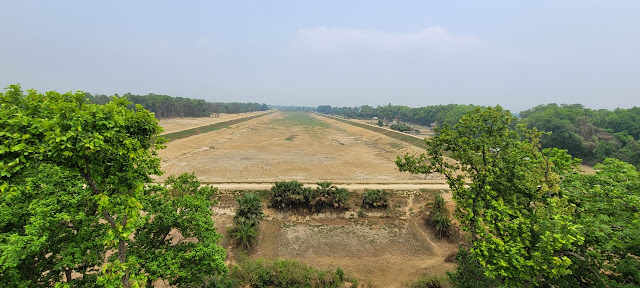Growers happy as mango trees blossom profusely
Mango growers and experts see bright prospect of a bumper production of mango this year as trees are in full bloom in Chapainawabganj and Rajshahi districts.
According to the Regional Horticulture Research Station (RHRS) in Chapainawabganj, about 80 percent mango trees in the country's largest mango-producing district have so far flowered, reports our correspondent Rabiul Hasan.
The weather has been favourable for flowering and if there is no prolonged draught, storm or foggy weather there would be a bumper production of mango this year, said Dr Md Shafiqul Islam, chief scientific officer of RHRS.
There are 16,72,500 mango trees on 22,300 hectares of land in Chapainawabganj district and Shibganj upazila has the highest 9,18,375 mango trees on 12,245 hectares of land, said sources at the Department of Agriculture Extension (DAE).
The district produced 1,05,000 tonnes of mango last year, they said, adding that the Barind region sees a gradual increase in mango cultivation as farmers find it more profitable than crop farming. The weather, temperature and soil of Barind region are suitable for mango cultivation.
Nazrul Islam, president of district mango traders association, said they have requested the authorities not to allow mango import at least for three months from May to July every year as mango orchard owners and traders face financial losses due to import of Indian mangoes.
Almost all the mango trees in the region are now covered with buds while a few early variety trees have started bearing fruits, as there is favourable weather condition, they said.
“If the climate remains favourable, we will see a bumper production this year,” said M Yunus Ali, additional director of DAE in Rajshahi region.
The annual average mango production is about 500,000 tonnes from over 45,000 hectares of land in eight districts including 'mango capital' Chapainawabganj, he said.
DAE officials are advising mango growers about taking some precautionary measures to protect the buds from hoppers during the fruiting period, he added.
Growers are taking care for protecting buds from insects by spraying insecticides, pouring water and fertiliser around the mango trees to ensure a good yield, said Sanwar Hossain, a mango orchard owner at Kasiadanga in Rajshahi city.
http://www.thedailystar.net/newDesign/news-details.php?nid=127900
According to the Regional Horticulture Research Station (RHRS) in Chapainawabganj, about 80 percent mango trees in the country's largest mango-producing district have so far flowered, reports our correspondent Rabiul Hasan.
The weather has been favourable for flowering and if there is no prolonged draught, storm or foggy weather there would be a bumper production of mango this year, said Dr Md Shafiqul Islam, chief scientific officer of RHRS.
There are 16,72,500 mango trees on 22,300 hectares of land in Chapainawabganj district and Shibganj upazila has the highest 9,18,375 mango trees on 12,245 hectares of land, said sources at the Department of Agriculture Extension (DAE).
The district produced 1,05,000 tonnes of mango last year, they said, adding that the Barind region sees a gradual increase in mango cultivation as farmers find it more profitable than crop farming. The weather, temperature and soil of Barind region are suitable for mango cultivation.
Nazrul Islam, president of district mango traders association, said they have requested the authorities not to allow mango import at least for three months from May to July every year as mango orchard owners and traders face financial losses due to import of Indian mangoes.
Almost all the mango trees in the region are now covered with buds while a few early variety trees have started bearing fruits, as there is favourable weather condition, they said.
“If the climate remains favourable, we will see a bumper production this year,” said M Yunus Ali, additional director of DAE in Rajshahi region.
The annual average mango production is about 500,000 tonnes from over 45,000 hectares of land in eight districts including 'mango capital' Chapainawabganj, he said.
DAE officials are advising mango growers about taking some precautionary measures to protect the buds from hoppers during the fruiting period, he added.
Growers are taking care for protecting buds from insects by spraying insecticides, pouring water and fertiliser around the mango trees to ensure a good yield, said Sanwar Hossain, a mango orchard owner at Kasiadanga in Rajshahi city.
http://www.thedailystar.net/newDesign/news-details.php?nid=127900


Comments
Post a Comment